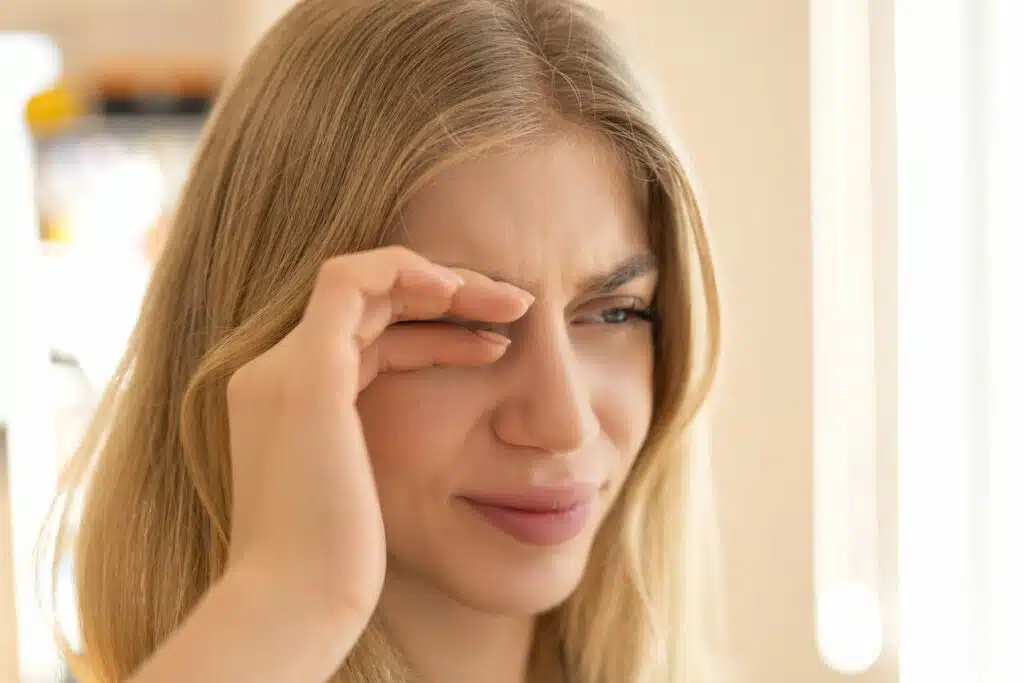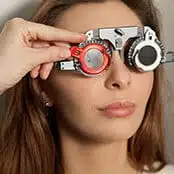
Dry, irritated eyes can turn your daily activities into a struggle. It can make activities like reading a book, working on your laptop, or being outdoors a challenge. Mild cases might respond well to at-home solutions. However, some symptoms will indicate that you need professional care.
This guide will help you understand the causes, symptoms, and treatment options for dry eye relief. It will also help you decide if you need to consult an eye care specialist.
What is Dry Eye Syndrome?
Dry eye syndrome occurs when your eyes do not produce enough tears to keep your eyes moist. Alternatively, your tear quality might be insufficient to lubricate your eyes. This results in dryness, irritation, and sometimes blurred vision.
Dry eye syndrome might feel like a minor inconvenience at first. However, untreated dry eye syndrome can worsen, causing more severe symptoms. Eventually, this can result in lasting damage to your eye.
Common Causes of Dry Eye Syndrome
You can develop dry eyes for various reasons, such as:
- Aging
- Autoimmune disorders, diabetes, and thyroid problems
- Exposure to wind, smoke, or dry air
- Staring at screens for long periods reduces blinking, leading to eye strain and dryness
- Antihistamines, antidepressants, and blood pressure drugs
Symptoms of Dry Eye Syndrome
The symptoms of dry eye syndrome can range from mild to severe. Recognizing these symptoms early on is critical for effective dry eye relief. The most common symptoms are:
- A stinging or burning sensation
- Redness and irritation
- Blurry vision
- Light sensitivity
- A gritty feeling in the eyes
Home Remedies for Dry Eyes
You can treat mild cases of dry eye syndrome at home. These self-care tips can provide significant relief:
- 20-20-20 Rule: Every 20 minutes, look at an object 20 feet away for 20 seconds to reduce eye strain and encourage blinking.
- Stay Hydrated: Healthy tear production requires that you maintain proper hydration.
- OTC Eye Drops: Eye drops are effective for mild cases of dry eye syndrome.
Should I See a Specialist for Dry Eye Syndrome?
At-home remedies can be effective for mild cases of dry eye syndrome. However, some cases of dry eye syndrome require professional evaluation. Early diagnosis and treatment can prevent long-term symptoms from occurring.
Recognizing when it is time to consult a specialist is vital for managing dry eye syndrome. You should see a specialist if your symptoms persist after using home remedies. Common signs that warrant professional evaluation include:
- Pain or swelling
- Recurrent eye infections
- Difficulty wearing contact lenses
Excessive tearing or feeling something in your eye can indicate the condition is getting worse. Redness or inflammation that does not subside can indicate advanced dry eye syndrome. Light sensitivity is also concerning, and warrants seeing a specialist.
It is important to act promptly if these symptoms disrupt your daily routine or cause discomfort. An eye care specialist can help identify underlying causes and recommend treatments tailored to your specific needs. Continuous care helps ensure better long-term outcomes for your eye health.
Treatment Options for Dry Eyes
Eye care doctors can offer a range of treatment options. The kind of treatment you receive will depend on your condition and lifestyle. Here are some possible methods your doctor might suggest:
Eye Drops
Eye drops play a crucial role in managing dry eye syndrome. However, not all OTC eye drops are the same. An eye specialist can determine the cause behind your dry eye syndrome, so you can use the correct type of eye drops.
Prescription Medications
Prescription medications are typically recommended for severe cases of dry eye syndrome. Your eye doctor may prescribe eye drops like cyclosporine (Restasis) or lifitegrast (Xiidra). These medicines help control inflammation and stimulate tear production.
Punctal Plugs
Your ophthalmologist will insert tiny devices into the tear ducts to prevent tear drainage. Retaining the fluid in your eyes helps naturally lubricate them.
Nutritional Supplements
Studies have shown that omega-3 fatty acids help improve the quality of tear film. Your eye doctor might recommend that you start taking supplements. Alternatively, you may need to modify your diet.
Finding the Right Eye Care Specialist
Choosing the right eye care doctor is critical for long-term dry eye relief. Effective treatment of advanced dry eye syndrome requires professional expertise.
Research Credentials
Look for an ophthalmologist or optometrist with experience in treating dry eyes and related conditions. A specialist in dry macular degeneration treatment may also offer advanced care.
Ask About Technology and Expertise
Ensure the clinic utilizes state-of-the-art diagnostic tools. Having board-certified ophthalmologists and optometrists ensures they use up-to-date treatments.
Find an Eye Doctor Near You
When looking for a local expert, use targeted online searches to find eye care professionals in your area. Having a convenient clinic near you makes it easier to attend follow-up appointments. Your eye specialist will be able to monitor your treatment and adjust as necessary.
Schedule a Consultation
A face-to-face consultation can help determine your relationship with an eye specialist. It is important that you feel comfortable with the recommended treatment plan and in communicating with your provider.
Long-Lasting Dry Eye Relief in Washington, MO
Managing dry eye syndrome early helps prevent more severe symptoms from developing in the future. An eye specialist can determine the underlying cause behind your dry eyes and devise an appropriate treatment plan. More importantly, they can address your concerns if your eye condition becomes severe.
Need help finding the right specialist? Visit the Advanced Sight Center and take the first step toward healthier eyes today. Our eye care doctors are board-certified, ensuring that you get advanced quality care. Call (636) 239-1650 or schedule a consultation to learn more.
We look forward to serving you!
Sources:
https://www.mayoclinic.org/diseases-conditions/dry-macular-degeneration/symptoms-causes/syc-20350375
https://www.mayoclinic.org/diseases-conditions/dry-eyes/symptoms-causes/syc-20371863
https://my.clevelandclinic.org/health/diseases/24479-dry-eye
https://www.aao.org/eye-health/diseases/what-is-dry-eye



